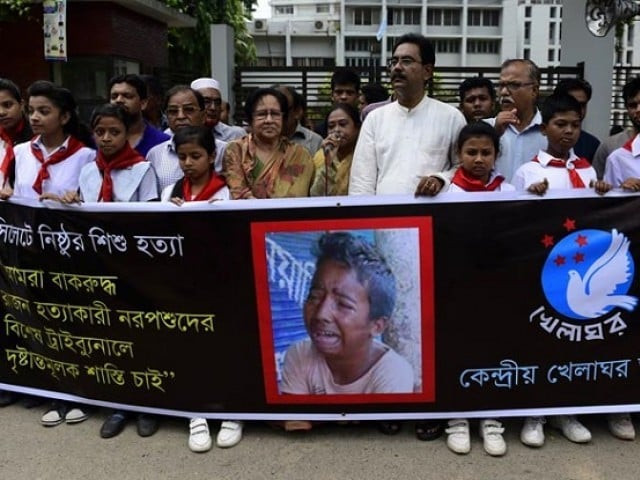Protests in Bangladesh over latest child killing
Killing comes after nationwide protests in July over lynching of another 13-year-old boy

Bangladeshi protesters carry a banner during a demonstration against the lynching of a 13-year-old boy in Dhaka. PHOTO: AFP
Hundreds of protesters took to the streets of the city of Khulna to demand justice for Mohammad Rakib, who died late on Monday after the employer forced the compressor tube into the boy's rectum and turned on the machine.
Read: Bangladesh arrests man for 'filming' boy's lynching
"This is the worst murder I have ever seen in my professional life. This is simply medieval barbarism," Nibash Chandra Majhi, police commissioner of the south-western city, told AFP.
Residents demonstrated after earlier storming the motor mechanic's workshop where the killing occurred, dragging out the boss and two others and handing them over to police.
The boy's mother and sister took part in the protests, while his father was shown on television bursting into tears and saying "I want justice".
The killing comes after nationwide protests in July over the lynching of another 13-year-old boy, which was captured on video and uploaded onto social media.
Police have arrested about a dozen men over the murder of Samiul Alam Rajon, who was tied to a pole and beaten to death while pleading for his life in the city of Sylhet.
The video went viral, prompting soul-searching over the nation's treatment of poor children.
In the latest incident, police said the employer, Mohammad Sharif, was enraged after Rakib left his workshop a few months earlier for another job.
Read: Bangladesh clashes over war crimes verdicts kill 52
Sharif and two others grabbed the boy as he passed near the workshop on Monday evening, central city police chief Sukumar Bishwas said.
"The boy was dragged inside the workshop and the culprits led by Sharif inserted a blow pipe of an air compressor, which is used for inflating car tyres, in his rectum and switched on the machine," he told AFP.
He was rescued by locals and rushed to hospital but died of internal injuries.
The three men remain in custody as the police investigation continues.
According to UNICEF, more than 3.2 million children aged between 5 to 17 hold jobs in Bangladesh. Of them, at least 1.3 million are working in hazardous conditions such as tanneries.



















COMMENTS
Comments are moderated and generally will be posted if they are on-topic and not abusive.
For more information, please see our Comments FAQ